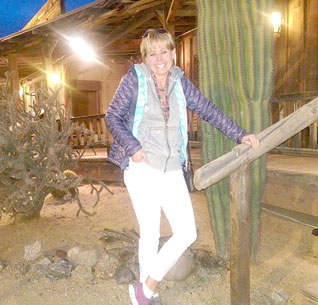
Hanna’s Shawna Johnston considers herself one of the lucky ones when it comes to living with the mystery that is Multiple Sclerosis, commonly
referred to as MS.
“There’s no two people with MS that will have the same outcome,” Johnston explains. “Everybody is different.”
Johston said she feels very blessed, in that a year after she was diagnosed, she took part in the Copaxone drug study for 18 months. The drug was approved in Canada after the study, and Johnston said her MS was pretty stable over the years, and she was able to continue on that medication until two years ago.
At that time, she’d gotten blurred vision in one eye, and doctors noticed MRI activity of her brain shwoing her medication was no longer effective, and switched her to Gilenya, an immune suppressor.
Current medical belief is that Multiple Sclerosis is an auto-immune diseas,e Johnston said.
An auto-immune disease is described as the body’s immune system attacking the body’s tissues and organs.
Johnston was diagnosed with MS 18 years ago.
“It’s” more common between 20 and 40, when you get diagnosed,” Johnston said. She was thirty years old.
The first thing she noticed was the bottom of her right foot went numb, and then that feeling spread up to the top of her head.
“So you could cut me in half, literally, and my whole right side was numb,” she explains. “It was a little scary.”
She said the numbness lasted about six weeks,then started to subside, from the top of her head down.
She did some research and thought she might have Lou Gherig’s disease, formally called ALS, but was praying for MS - the two diseases present the same, she said. Her symptoms were in July, she had a MRI in September, was diagnosed in October. She said she was fortunate in being hooked into the MS society by her GP in Calgary, who was also doing some research with the MS clinic, and so was familiar with the disease.
“They can’t really tell you where you’re going to be, having said that, the longer you go without having another attack, the better it is,” Johnston said.
“My last attack was four years ago, for example. The longer period of times you go between attacks, the better it is. Then you get diagnosed with relapsing or remitting MS.”
Johnston said there’s no way to prevent an attack, but preventative measures include diet, exercise, getting plenty of rest, keeping stress low.
She said an MS attack sends no warning- those with the disease will notice its recurrance when they get an onset of a symptom, such as numbness, vision impairment, or lack of mobility. She said it gets worse “And then your hope is that it will get better. And then it will subside.”
Johnston has been a part of the area’s MS Society for a number of years, including being on the board. “The MS Society has been really great at providing support over the years, especially after I was first diagnosed,” Johnston said. “You can phone them, there’s someone to put you in the right direction. And through our Drumheller chapter, we’ve been able to offer support and services to Drumheller and the surrounding area.”
She said the big reward is being able to help those in the community with MS, especially giving support for those first diagnosed.
Johnston was previously involved with the Hanna MS Society, and values the work they’ve done with clients over the years.
“This is great that the MS Society raises money,” Johnston said “to help with research. And I fully endorse the research. Because without the research, we have no hope.”
The Drumheller Jayman Built MS Walk is scheduled this year for May 3, and the Hanna Relay for Life in support of those with MS takes place on June 5, from 7 p.m. to 7 a.m. beginning at Hector King Hunter Park.
Those wanting more information on MS Alberta can visit http://mssociety.ca/alberta/default.htm.
Further information on the disease can be found at the MS Society of Canada site atmssociety.ca/en/help/clinics.htm.
Alberta has the Multiple Sclerosis Patient Care and Research Clinic at the Kaye Edmonton Clinic on University Avenue in Edmonton. Appointments are by referral, and the number of the clinic is 780-407-5515, Monday to Friday, 8:30 am to 4:00 p.m.